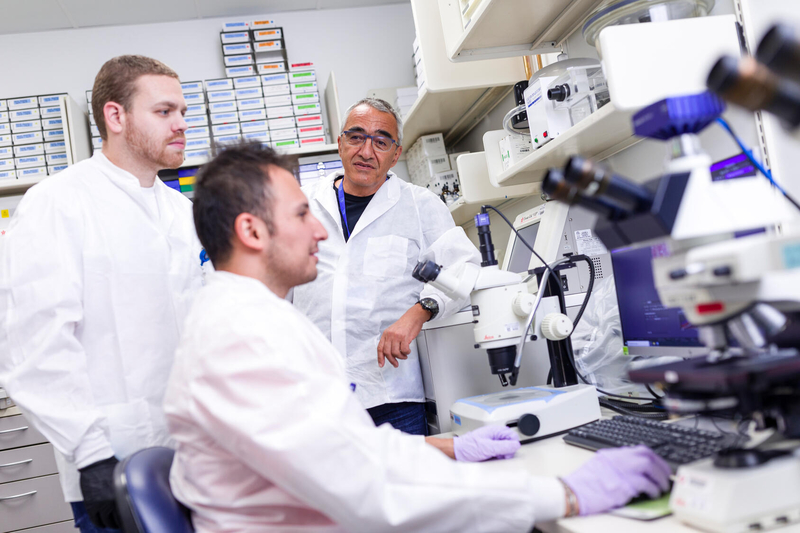
Medical Research with Big Data: The All of Us Research Program
Self-Paced Online
11/17/2025 - 11/16/2027
$150
4 hours
Discover how to leverage the extensive NIH All of Us Research Program data repository in your research. This course covers the Researcher Workbench, research methodologies, ethics, and more.
Summary
This course, Medical Research with Big Data: The All of Us Research Program, provides an introductory understanding of secure medical data repositories, with a focus on the NIH All of Us Research Program. Participants learn how to navigate the Researcher Workbench, conduct research using large datasets, and adhere to best practices in data security, privacy, and ethical considerations. The course also covers support resources and steps to initiate research projects, ensuring researchers are well-equipped to leverage these data repositories effectively.
Learning Objectives
- Describe the structure, purpose, and types of large medical data repositories available to researchers.
- Analyze available data types and differentiate between the levels of data access provided by the All of Us Research Program.
- Demonstrate how to access and effectively navigate the Researcher Workbench and utilize available tools.
- Apply appropriate research methodologies and budgeting strategies for analyzing large, diverse datasets.
- Learn about data security, privacy protections, and ethical research practices in the All of Us Research Program.
- Leverage institutional and community resources to enhance your project.
Access to this online course is available from the date of purchase until it expires on November 16, 2027.
The Medical Research with Big Data: The All of Us Research Program course is an online self-paced course that can be completed in approximately four hours. The course is delivered in six modules:
- Introduction to Medical Data Repositories
- Exploring the All of Us Program, Dataset and Data Access Tiers
- The Researcher Workbench: Access, Navigation, and Tools
- Conducting Research: Methodologies and Best Practices
- Security, Privacy, and Ethical Considerations
- Support Resources and Next Steps
To complete this program, you must review all content, achieve a score of 80 percent or higher on the summative exam, and complete all required surveys. You will be awarded a certificate you can download, print, or share online upon fulfilling these requirements.
Technical Requirements
- Computer with internet access
- Speaker or headset
- Full sized monitor
- Web browser
This course is suitable for learners at any level of interest in using large data repositories, specifically the NIH All of Us Research Program.
 |
Milovan Suvakov, Ph.D.Research Associate, Division of Biomedical Statistics and InformaticsMilovan Suvakov, PhD, is a Research Associate in the Division of Biomedical Statistics and Informatics within the Department of Quantitative Health Sciences at Mayo Clinic. His bioinformatics research centers on developing advanced computational methods for detecting mosaic copy number variations (CNVs) from large-scale whole-genome sequencing data. This work provides him with deep expertise in managing and interpreting complex datasets, supporting scientific projects that rely on the massive data repositories addressed in this course. His scientific background spans theoretical and computational physics, numerical modeling, and complex systems analysis. His multidisciplinary perspective bridges statistical methodology, high-performance computing, and biological insight, advancing the development of scalable computational tools for more accurate and comprehensive genomic discovery. |
 |
Shauna Overgaard, Ph.D.Senior Director, AI Strategy and FrameworksCo-Director, AI Validation and Stewardship ProgramShauna Overgaard, PhD, is Senior Director of AI Strategy and Frameworks at Mayo Clinic and Co-Director of its AI Validation and Stewardship Program. She designs risk-tiered assurance frameworks for LLM-enabled research, translating prototypes into reliable, decision-grade tools. Her work integrates human factors, statistical and clinical validation, and lifecycle monitoring, linking claims to auditable, provenance-rich evidence with clear limits-of-use and equity safeguards. Nationally, she co-chairs the National Academy of Medicine AI Code of Conduct (Health Systems and Payers). She serves on the editorial board of npj Health Systems and is a guest editor for BMJ Health and Care Informatics and Mayo Clinic Proceedings: Digital Health. She was recognized as a Rising Star in Modern Healthcare’s 2025 Leading Women in Healthcare. |
This course is available free of charge to Mayo Clinic employees thanks to support from the Mayo Clinic Center for Clinical and Translational Science (CCaTS).
Mayo Clinic employees - To enroll, click Login along the top navigation and click on the Mayo Clinic Employee Log In button. The course cost will display as free of charge at the bottom of the page and when the course has been added to the shopping cart.
Accessibility
Mayo Clinic College of Medicine and Science strives for fully accessible learning experiences. If you need disability-related accommodations, please contact the Office of Wellness and Academic Support – Disability Access Services at MCCMS.DS@mayo.edu or submit the Accommodation Request form.
Frequently Asked Questions
Who is the intended audience for this course?
This course is suitable for learners at any level of interest in using large data repositories, specifically the NIH All of Us Research Program.
Is the course geared toward participants internal to Mayo?
The content of this course is geared toward participants both internal AND external to Mayo Clinic.
Is a certificate issued upon completion of the course? If so, what kind?
Attendees will receive a certificate of participation.
Is there a discount for Mayo Clinic employees?
Yes, we are pleased to offer this course free of charge to Mayo Clinic employees thanks to support from the Mayo Clinic Center for Clinical and Translational Science (CCaTS). To enroll, click Login along the top navigation and click on the Mayo Clinic Employee Log In button. The course cost will display as free of charge at the bottom of the page and when the course has been added to the shopping cart.




